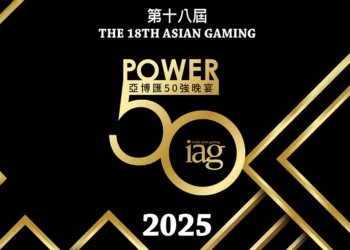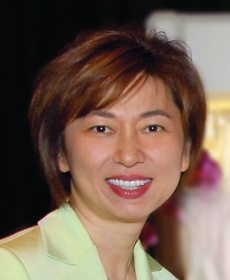 11 (12) Linda Chen
11 (12) Linda Chen
Chief Operating Officer
Wynn Resorts (Macau) S.A.
It’s a truism of sport that consistency of management leads to consistency in a team’s success. Wynn’s Macau market rivals Las Vegas Sands Corp and Melco Crown Entertainment have been changing senior executives in Macau almost with the regularity that soccer players change their boots. Wynn, meanwhile, appears to have focused on choosing the right people first time around and then cultivating their talent and adequately rewarding their achievement.
The prime example is Linda Chen, Chief Operating Officer of Wynn Resorts (Macau) S.A. She signed a new 10-year contract in May worth a basic US$1.5 million per year. If performance related pay and stock options are added to Ms Chen’s basic salary package, the deal should ensure she remains one of the highest paid female executives in any industry.
The new contract runs until 24th February, 2020, and appears to be a major vote of confidence by Steve Wynn and the rest of the board in Ms Chen. It comes after another successful and within budget launch of a Wynn property in Macau—the US$600 million Encore at Wynn Macau, which opened in April.
Cornell and Stanford-educated Ms Chen is credited with playing a vital role in ensuring that Wynn’s core product in Asia—Wynn Macau—had agreements with high roller agents when it opened in September 2006. That allowed Wynn Macau to grab market share disproportionate to the property’s footprint and table count.
Ms Chen, a former Executive Vice President of International Marketing for MGM MIRAGE in the US, is also a member of the Wynn Resorts board. It’s likely she will be tackling a new challenge shortly after her boss, Steve Wynn, announced in June that the company plans to build a third resort in Macau, on Cotai, with an expected opening date in 2014.
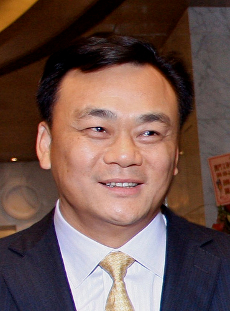 12 (10) Jack Lam
12 (10) Jack Lam
Chairman
Jimei Group
All industries occasionally go through periods of realignment where market leading companies experience a dip in performance and hungry newcomers begin to rise. The casino industry is no exception. That cyclical phenomenon has been seen recently in the Macau junket sector—the vital component in the territory’s massive gaming revenues.
A few decades ago, it was Dr Jack Lam who was the hungry outsider, starting out as modest sub-agent feeding players to junkets. The typical career path for a talented newcomer to the world of junket operations is eventually to set up a VIP business in his or her own right. This usually involves a core junket operation in Macau, typically supplemented by a casino cruise ship steaming out of Hong Kong. Dr Lam took a slightly broader path, turning his business international, with interests in the Philippines, including holiday resorts and telephone betting targeted at offshore customers. He also became a casino operator in his own right with Jimei, the SJM-licensed casino attached to the Grand Lapa Hotel in downtown Macau.
These are considerable achievements for this native of Mouming in Guangdong province, mainland China. Dr Lam moved to Hong Kong in 1979 at the age of 18. According to his official company biography, he started out as a bookkeeper at his uncle’s factory, sending most of his salary back home to help his family. He got his introduction to gaming through his uncle, who played regularly in Macau.
After accompanying his uncle on several trips to Macau, Dr Lam built up a network of contacts and started working as a junket sub-agent—a ‘ground floor’ role that gave him insights into building and maintaining customer relationships. In 1981, Dr Lam started work as a representative for a small junket in Macau, and gradually worked his way up to becoming a junket operator in his own right, and now effectively a junket consolidator, using economies of scale to create back office efficiencies.
Part of Jimei’s traditional appeal for junket agents has been a willingness to pay competitive commissions. That contributed to a rapid growth in Jimei’s Macau operations following market liberalisation in 2002. The growth was sustained even after the Macau government imposed a 1.25% cap on commissions payable to junkets in September last year. But along with that reputation for being a competitive payer went an equally strong reputation for Jimei demanding its rights from junket partners.
This is potentially problematic if pushed beyond certain limits. VIP operations in Macau are still remarkably informal by Western commercial standards, relying often on verbal agreements between players and agents, rather than formal contracts. As such, the relationship between those involved is at times more like a love affair than a business deal. The suggestion in the industry is that recently Dr Lam’s organisation has gone lighter on the love, and heavier on the bottom line.
Younger, possibly friendlier, companies operating in the Macau VIP sector either as junket aggregators or working capital providers for junket agents, are now putting pressure on Jimei’s business. Whether Dr Lam can reverse this trend and regain some of the ground he appears to have lost in recent months will be interesting to see this time next year.
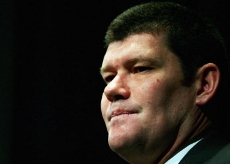 13 (8) James Packer
13 (8) James Packer
Co-Chairman
Melco Crown Entertainment
His name may be on the deeds, but James Packer could best be described as semi-detached when it comes to the dayto- day business of running his portion of Macau’s gaming industry.
Mr Packer was notably absent from the first anniversary party in June for City of Dreams (CoD)—the second offspring from the marriage of his Australian casino operating company Crown Ltd and Lawrence Ho’s Hong Kong-listed Melco. His absence did little to dispel rumours—circulating earlier this year but strongly denied by Melco Crown—that Mr Packer would like to exit the Macau gaming market.
Any doubts Mr Packer may have about his overseas gaming investments were probably lessened this summer after Crown Ltd recorded A$292 million profit in its 2009- 10 annual results published in August. That was in part due to a narrowing of operational losses in Macau (Crown’s share of the loss was A$64 million) now that CoD is open and generating cash to service the debt raised on its US$2.4 billion cost. In 2008-09, Crown was hit with A$1.7 billion in write offs on its North American casino investments, leading to a loss of A$1.2 billion for the year.
Mr Packer and Mr Ho’s Macau tie up was initially billed by the media as a kind of Chris Tucker and Jackie Chan double act for the gaming industry. It involved two ambitious and relatively young entrepreneurs who were going to shake up the status quo with their ideas and energy. With two MPEL productions in the can in the form of CoD and Altira Macau, it’s clear with hindsight things turned out less like ‘Rush Hour’ and more like ‘Big Trouble in Little China’.
Their first effort, Crown Macau (now Altira), opened massively over budget— 203% over, in fact—in May 2007. It had a final price tag of US$583 million, compared to its original estimated budget of US$192 million. Even worse, it was six months late. After the belated opening, it limped along in its chosen segment, the VIP market, until the cavalry came to the rescue in the form of a prominent marketing executive who has worked extensively with Lawrence Ho’s father, Dr Stanley Ho. He in turn introduced Crown Macau to AMA, a junket consolidator subsidiary of Amax Holdings (a company that was already an investor in the SJMlicensed Greek Mythology casino next door to Crown Macau on Taipa). Thus was born the now legendary 1.35% rolling chip commission deal for junkets that reversed Crown Macau’s fortunes. The reversal was temporary, however, with the business case for the AMA deal unravelling following the Macau government’s capping of commission rates at 1.25% in September last year.
Project cost control has not been MPEL’s strong suit. When CoD opened in June 2009, the final bill came to over US$2.4 billion— 12.5% above the US$2.1 billion estimated cost MPEL gave in a filing to the US Securities and Exchange Commission in October 2007 and 37.5% above the original US$1.5 billion estimate submitted in a 2006 filing. To be fair to the company, all the Macau operators were affected in 2007- 08 by cost overruns or pressures relating to commodity inflation linked in part to China’s fast economic growth.
On the upside, although CoD has lagged in performance in the fast growing Macau VIP segment, it has been generating significant cash to support the Macau operation, to the extent that MPEL has felt sufficiently confident to go back to the money markets to strengthen its balance sheet. In May, MPEL said it was offering investors S$600 million worth of senior notes (due in 2018) via the Singapore stock exchange. The company said the exercise would reduce its debt burden on CoD. That could be another good reason for Mr Packer to stick around for the Macau ride.
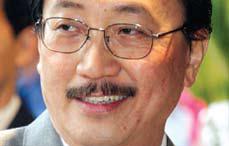 14 (15) Vincent Tan
14 (15) Vincent Tan
Chairman and CEO
Berjaya Corporation
In June, Malaysian gaming entrepreneur Vincent Tan Chee Yioun missed out on a chance to add US$161 million to his already considerable fortune.
The group he founded, Berjaya, was due to pay him that equivalent in Malaysian ringgit (RM525 million) for a 70% stake in a Malaysian sports betting operator called Ascot Sports. The company had previously won government approval for its operations. But the authorities changed their mind and instead withdrew Ascot’s permit at short notice.
Ascot’s licence was designed to offer a legally sanctioned and properly taxed alternative to Malaysia’s illegal sports betting industry. Some Malaysian media reports said the withdrawal of the permission was due to ‘public pressure’ against the legalisation of sports betting in the majority Muslim country.
In an unusually candid press statement for a Malaysian business, Berjaya said it “deeply” regretted the government’s decision on Ascot and was “extremely disappointed”. The country’s media also reported that shortly after the Ascot setback, Berjaya cancelled a proposed rights issue intended to raise RM614.5 million for business expansion.
Berjaya’s gaming business is based chiefly on its Sports Toto operation, Malaysia’s only national lotto operator, with around 700 outlets. The company has also been looking at opportunities in neighbouring countries. In April, Vietnam issued decrees on possible regulation of sports betting as well as a national lottery. Expressions of interest in tendering to provide such legal services were reported both from Berjaya Group and Italy’s Lottomatica Group.
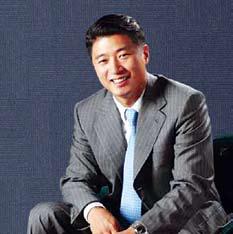 15 (16) Philip Chun
15 (16) Philip Chun
Chairman and CEO
Paradise Group
Mr Chun, chairman of Paradise Group since 2004, presided over a 21.3% increase in sales for this private sector South Korean casino operator during 2009.
Paradise runs five foreigners-only casinos in Korea, plus a boutique property in Nairobi, Kenya. The company’s flagship is Sheraton Walker-hill Casino, founded in 1968 in the South Korean capital, Seoul. The group also has a spa and hotel in Dogo, Chungnam, but 97% of Paradise’s sales come from gaming, according to the financial report for 2009.
Those sales reached KRW340.7 billion (US$280 million), a 21.3% increase from the previous year. Operating income reached KRW28.4 billion, surging 107.2% year on year.
Paradise Casino, located at Haeundae Beach at the port city of Busan, opened in 1981 and offers live games including blackjack, baccarat and roulette, along with 40 slot machines.
Paradise Grand Casino, located in the Grand Hotel, Jeju Island, is five minutes from the local airport, and offers various table games and 50 slot machines. Lotte Casino, also on Jeju, offers customers 87 Las Vegas-style gaming machines in two private VIP rooms.
Paradise Casino Incheon was the first South Korean casino opened to foreigners in 1968. It was renamed Golden Gate Casino when it moved to the Hotel Hyatt Regency Incheon near the city’s airport in August 2005.
Paradise Safari Park Casino in Nairobi, Kenya, has 40 tables offering blackjack, poker, pontoon and roulette plus 100 gaming machines.
The potential for the South Korean casino market would be much greater if the government were to open the whole market to domestic players. Kangwon Land, the nation’s only casino open to South Korean passport holders, is expected to record gross revenues of US$2.3 billion in 2010, according to industry research company Korea Leisure Industry Consulting. There is no sign currently that liberalisation of access is on the political agenda.
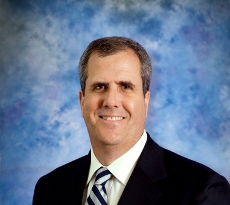 16 (-) Stephen Weaver
16 (-) Stephen Weaver
Consultant
Sands China
Australian Stephen Weaver could justly be called one of the great survivors of Las Vegas Sands Corp. On 19th May this year, he left his job as Executive Director of Sands China after five hectic years in Macau. It was an open secret in local industry circles that Mr Weaver’s departure occurred after a power struggle with Steve Jacobs, at that time President and Chief Executive of Sands China. “Two Caesars are one too many,” as Augustus, the first Roman emperor once famously observed.
Only two months later, Mr Jacobs was out, and Mr Weaver quickly returned to the Sands China family as a consultant. Michael Leven, LVS President and COO, made noises about the possibility of Mr Weaver’s return becoming permanent—or at least as permanent as any senior job in a major public company can ever be.
If Mr Weaver’s return were to be permanent, it seems it won’t be as President and CEO of Sands China. In August, Mr Leven, acting as caretaker CEO of Sands China, said the company hoped to hire “an Asian” for the post.
Mr Weaver’s background is as a property lawyer in senior management positions with Savills and Jones Lang LaSalle. The most obvious reason for his return to Sands China would be to drive through development of the company’s US$4.2 billion Cotai 5 and 6 projects extending its real estate on the Cotai Strip™. The project is around twice the size of The Venetian Macao. That’s a demanding task even without the headache of having to hire one local construction worker for every migrant brought onto the site, as demanded by the Macau government.
If anyone can solve this conundrum, it’s likely to be Mr Weaver. He already has a good track record as a project boss. He first joined LVS in 2005, becoming Chief Development Officer in Macau in the early phases of the US$2.4 billion Venetian Macao. In September 2006, Mr Weaver was promoted to President, Asia, for Las Vegas Sands Corp where he successfully managed the completion, outfitting and launch of The Venetian’s massive real estate inventory prior to its opening to the public in August 2007.
After Steve Jacobs became President, Macau, for LVS in May 2009, and then Chief Executive of Sands China in August 2009 prior to Sands China’s successful flotation on the Hong Kong stock market, Mr Weaver’s public profile diminished to the point of near invisibility. While Mr Weaver is now back as a consultant, he may prefer to stick with what he apparently does best—making big projects happen—rather than getting immersed in big company politics.
 17 (14) Winfried Engelbrecht-Bresges
17 (14) Winfried Engelbrecht-Bresges
CEO
Hong Kong Jockey Club
Hong Kong Jockey Club’s gross revenue from soccer betting has risen more than tenfold since it first introduced the product range in 2003. In 2008-09, it brought in HK$35.1 billion (US$4.52 billion). That’s impressive for a single betting product stream targeted at a purely domestic market of around 5.5 million Hong Kong adults. Indeed, it compares favourably with the US$15.4 billion generated by games of fortune in Macau in 2009 by 21.7 million visitors.
That wasn’t, however, enough to prevent Hong Kong’s leading English-language daily newspaper, The South China Morning Post, calling in mid-July for a ‘debate’ on ending the legal betting monopoly enjoyed in Hong Kong by the HKJC.
The paper was reacting to a more than fourfold increase in the betting stakes reportedly flowing into the accounts of unauthorised bookmakers serving customers in Hong Kong and Southern China during World Cup 2010, compared to the previous tournament held in 2006.
There are few more ardent or eloquent advocates for reform and innovation in state monopoly betting industries than Winfried Engelbrecht-Bresges, the Chief Executive of the HKJC. But there is only so much he can say and do on those topics without risking losing the confidence of his political bosses, the Hong Kong lawmakers.
The territory’s Jockey Club was born of political necessity—the need to raise public money to pay for housing for an influx of refugees from mainland China to Hong Kong in the early 1950s. It continues to survive out of political necessity—the need to give the city’s inhabitants an outlet for their gambling passions in a legally controllable and taxable way. As such, HKJC is unlikely ever to be given a totally free hand in the way it conducts its business. That will make it hard, if not impossible, to offer players the kinds of terms provided by unlicensed online or telephone bookmakers who have few of the overheads, in particular tax and community contributions, faced by the HKJC.
Even if Hong Kong were to deregulate its betting market and introduce legal competition to the Jockey Club, the legal competition would still have taxes or other forms of levy imposed on its gross turnover.
Mr Engelbrecht-Bresges and others within the Jockey Club hierarchy have argued publicly and privately that the issue is not whether private gambling franchises should be allowed as alternatives to the HKJC, but that the Club itself should be allowed to pursue a more aggressive commercial policy. That’s in terms of reducing the tax levied on the bets, increasing the maximum daily dividends allowed, widening the range of betting products offered and developing the way products are delivered to customers. All these suggested initiatives are designed to fend off the competitive threat from unauthorised bookmakers.
Tax is levied at 50% of net stake receipts for HKJC soccer betting and the Club also gives some of its operational surplus to community causes. The unauthorised bookmakers—provided they have a sufficiently large prize pool—can potentially offer bigger individual dividends than the HK$10 million (US$1.29 million) per account per betting day allowed by HKJC. Illegal bookies also reportedly offer punters credit for gambling—something which, for regulatory and ethical reasons, the HKJC simply cannot do.
In 2008-09, HKJC football betting contributed more (HK$370 million) to community causes via the HKJC Charities Trust than the core horse racing product (HK$110 million). That was linked to structural issues, as large amounts of income from horse racing were reinvested in facilities for equestrian sport in Hong Kong before, during and after the Beijing Olympics in 2008 (the equestrian events of the games were hosted in Hong Kong).
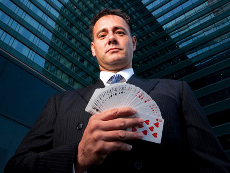 18 (-) Tom Hall
18 (-) Tom Hall
Vice-Chairman
AsianLogic
Tom Hall is a founder of AsianLogic (ALOG) one of the largest online casino businesses in the region. At the time of going to press, that growth was due to continue through acquisition of another large Asian online gaming brand.
Mr Hall is recognised as one of the world’s leading experts on interactive gaming, with a particular focus on Asia Pacific markets. He speaks regularly on the subject at gaming conferences and investor forums. Mr Hall started ALOG in 2002 with fellow directors Chris Parker and Kan Tang. ALOG was one of the pioneers of online gaming and betting in Asia. The company’s services cover the development, operation, management and marketing of online casinos (including live video streaming of casino gaming via secure studios in the Philippines). It also facilitates online poker, multiplayer P2P (peer-to-peer) games and Asian games, and online and land-based sports betting.
In February 2008, ALOG announced it had acquired the land-based franchise for the Asian Poker Tour from a Singapore company. The APT main events in Macau, Manila and beyond attract top professionals as well as amateurs qualifying via online games provided by the APT’s satellite partners.
Since its foundation, ALOG has worked with Playtech—an online gaming software supplier started three years before ALOG. Playtech is now the world’s largest publicly traded company in its field. It is internationally recognised for its groundbreaking work in gaming technology. Playtech is credited with online innovations including simultaneous multi-window casino game play and one-time account creation and login for integrated third-party systems. Mr Hall held executive roles at both ALOG and Playtech until 2008.
ALOG has also worked with the pioneering former casino website DrHo888.com on live video streaming. ALOG maintains online gambling licences in Alderney (one of the UK’s approved jurisdictions for online gaming licensing), the Philippines (through the Cagayan Economic Zone Authority jurisdiction within the country) and Curacao in the Netherlands Antilles. ALOG also works in compliance with the regulator of landbased gaming in the Philippines—the Philippine Amusement and Gaming Corporation.
ALOG completed a US$250m flotation on the UK’s Alternative Investment Market in December 2007. Following the global financial crisis of 2008-09, ALOG successfully opted to return to private ownership.
Mr Hall, who began his business career in financial services, has also set up a gaming investment team within ALOG. It acts on a consultancy basis to international hedge funds, as a broker and advisor on mergers and acquisitions in the gaming sector and as an investor in its own right.
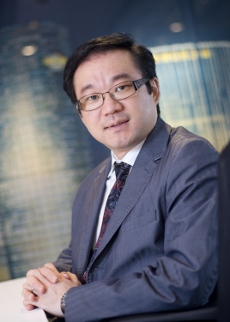 19 (-) Kelvin Tan
19 (-) Kelvin Tan
Senior Vice-President, International Marketing
Melco Crown Entertainment Ltd
Establishing and maintaining relationships with junket operators and high rollers is critical to driving VIP business to individual casino properties. Kelvin Tan is widely regarded as one of Macau’s preeminent VIP relationship builders, and his tireless efforts played a major role in helping Melco Crown (Nasdaq: MPEL) finally overtake Wynn Macau to take third place in the local casino market share race as of last month.
VIP baccarat contributed over 70% of the city’s total casino revenue in the first half of this year, and although all six Macau casino operators now clearly appreciate the need to cultivate VIP relationships, that wasn’t always the case.
Stanley Ho’s effective 42-year casino monopoly came to an end in May 2004, when Las Vegas Sands Corp (LVS) unveiled Sands Macao, which at opening contained 277 gaming tables in glitzy surroundings. The property’s much-hyped 10-month return on its initial US$265 million investment misses a crucial point—Sands Macao could have had made a much stronger start. That’s because it initially shunned the junkets who continue to control the bulk of the flow of VIP players into the city, as it concentrated on cultivating Macau’s long-neglected mass market.
By contrast, Waldo Casino, which opened two months after Sands and operated under Galaxy Entertainment Group’s licence, was solely focused on drumming up VIP business. Waldo, which had been hastily converted from an office building and housed a mere 38 gaming tables, managed to outgross Sands in 2004. While Waldo has now been relegated to an also-ran in Macau’s continuously expanding casino sector, the lesson from the initial results was obvious: VIP relationships matter.
To LVS’s credit, it learned that lesson quickly, and recruited Kelvin Tan in 2005 as Vice President of Business Development at its local unit, Venetian Macau Ltd. He led the first business development team charged with expanding the premium direct and overseas junket businesses for Sands Macao. During his time with LVS, Mr Tan was also part of the bid team that helped the company secure its Singapore casino license.
Mr Tan joined MPEL in January 2009, where he is responsible for the company’s entire International Marketing business, which includes overseeing the VIP Services operations, managing an International Marketing network with five branches, and managing over fifty junkets operating at both City of Dreams (COD) and Altira Macau.
MPEL now has the second-highest nonnegotiable chips turnover volume among Macau’s six concessionaires (behind only Stanley Ho’s SJM), even though it pays the second lowest commissions/rebates in the market. This underscores the fact Mr Tan has a genuine knack for nurturing relationships, in contrast to others who have sought to ‘buy’ business and waged ultimately fruitless price wars by offering ever-escalating commissions. With a commission cap inplace in Macau, Mr Tan’s talents should prove even more valuable from now on.
Mr Tan spent the earlier years of his gaming career in the Philippines and has worked for companies including Genting International Inc. and Waterfront Properties Inc. Before arriving in Macau, he founded and ran a consultancy offering strategic planning, feasibility studies, valuations and junket development programs for casinos across Asia.
Mr Tan holds a Bachelor of Science Degree in Business Administration and an MBA in Finance from Indiana University of Pennsylvania in the United States. He is also a graduate of the Executive Development Program of the University of Nevada, Reno.
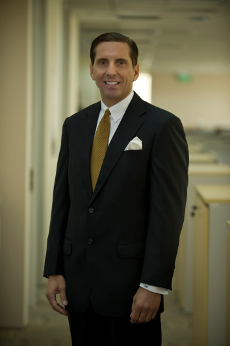 20 (-) Tom Arasi
20 (-) Tom Arasi
President and CEO
Marina Bay Sands Pte Ltd
Tom Arasi is the first President and CEO of Marina Bay Sands, the US$5.7 billion integrated gaming resort created in Singapore by Las Vegas Sands Corp (LVS).
In the nine months from his appointment in August 2009 to MBS’s ‘soft’ opening in April this year, Mr Arasi faced an intense examination of his leadership skills. There was a very great deal to do, in a very short amount of time. That pressure on the final phase fit out was due to several factors, including difficulties in earlier stages of construction. That’s not uncommon on big projects, but there were other factors unique to MBS. One was that the reclaimed land on which the property is built required a lot more real estate being pumped into the earth to stabilise it than the company or the designers had anticipated. That increased costs and caused some delays. A second was that the design—with its three 55-storey hotel towers topped by Sands SkyPark, complete with swimming pool—is so revolutionary there was no manual written indicating how hard it would be to complete or guaranteeing how long it would take. Third, with LVS’s global long term debt standing at US$11 billion at the beginning of 2010, there was pressure from the company’s bankers and institutional shareholders to start generating revenue from the enterprise quickly. Fourth and by no means least, the Singapore government was expecting the property to launch as close to the original 2009 timetable as possible in order to fulfil its function as an attractor of tourists to the city state.
When all those circumstances are considered, it’s a wonder Mr Arasi himself is still standing. It also puts into some wider context the technical glitches that occurred between the soft opening in late April and the gala opening in June. Mr Arasi could, however, have done without the bad publicity generated by a group of early, unhappy and potentially highly litigious MBS hotel and conference guests—lawyers from the Inter-Pacific Bar Association. It would be fair to say it’s unlikely many of them will be writing glowing reviews on tripadvisor.com.
Since then, the alleged problems—including a leaking conference hall roof, plus non-functioning air conditioning and lack of hot water in some hotel rooms, have reportedly been solved. That’s important. It would be overstating the case to say that the fate of LVS depends on a successful launch for the property. It is fair to say, though, that the way MBS performs will have a major long-term influence on the company’s share price and global earnings potential.
The key driver of MBS’s earnings is expected by analysts to be the 161,000 sq. ft casino and its accompanying VIP rooms. The company said MBS generated US$94.5 million of adjusted property EBITDA (earnings before interest, taxation, depreciation and amortisation) on an EBITDA margin of 43.7% in the stub quarter from 27th April to 30th June.
Mr Arasi comes from a hospitality rather than gaming background, so it will be interesting to see what his experience can bring to the bottom line in driving gaming and non-gaming sales. In Macau, LVS also hired non-gaming people to develop and run The Venetian Macao. Stephen Weaver has a background as a property lawyer, and Steve Jacobs, the former CEO, was a management consultant.
One of the reasons for hiring all three was probably their grasp of strategic issues. In Mr Arasi’s case, he previously led three international businesses for Bass Hotels and Resorts (which trades as InterContinental Hotels). His roles included serving as Global Brand Manager of Crowne Plaza Hotels and Resorts and as President of the group’s Americas division.

























